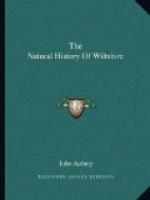The difficulty of reconciling the various opinions that were advanced with the Mosaic account of the Creation, was a great stumbling-block to the progress of geological science at the time when Aubrey wrote. He was not however inclined to read the sacred writings too literally on this subject, for after giving a part of the first chapter of Genesis, he quotes (from Timothy, ch. iii. v. 15) the words, “from a child thou hast known the Holy Scriptures, which are able to make thee wise unto salvation:” upon which he observes, “the Apostle doth not say, to teach natural philosophy: and see Pere Symond, where he says that the scriptures in some places may be erroneous as to philosophy, but the doctrine of the church is right”. It is presumed that the above passages, which indicate the general nature of Aubrey’s theory, will be sufficient, without further quotations from this chapter. — J. B.]
Præsentemq{ue} refert quaelibet herba Deum.- Ovid.
[This is one of the most copious chapters in Aubrey’s work. Ray has appended a number of valuable notes to it, several of which are here printed. Dr. Maton has quoted from this chapter, which he mentions in terms of commendation, in his “Notices of animals and plants of that part of the county of Wilts within 10 miles round Salisbury”, appended to Hatcher’s History of Salisbury, folio, 1843.-J. B.]
It were to be wish’t that we had a survey or inventory of the plants of every county in England and Wales, as there is of Cambridgeshire by Mr. John Ray; that we might know our own store, and whither to repaire for them for medicinall uses. God Almighty hath furnished us with plants to cure us, that grow perhaps within five or ten miles of our abodes, and we know it not.
Experience hath taught us that some plants have wonderful vertues; and no doubt all have so, if we knew it or could discover it. Homer writes sublimely, and calls them {Gk: Cheires Theion}, the hands of the gods: and we ought to reach them religiously, with praise and thanksgiving.
I am no botanist myselfe, and I thinke we have very few in our countrey that are; the more is the pity. But had Tho. Willisel* lived, and been in England, I would have employed him in this search.




